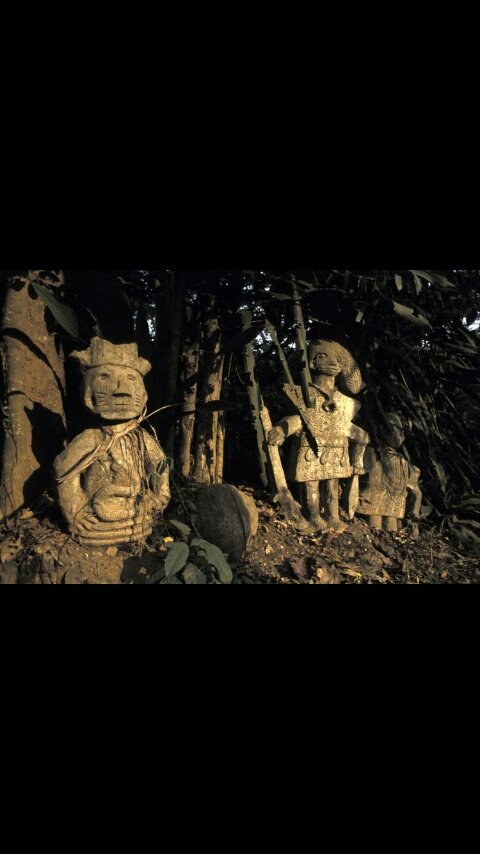religious place in Nigeria and sacred place
Nigeria, the most populous African country (with a population of over 182 million in 2015),[3] is nearly equally divided between Christianity and Islam, though the exact ratio is uncertain. There is also a growing population of non-religious Nigerians who accounted for the remaining 5 percent. The majority of Nigerian Muslims are Sunni and are concentrated in the northern region of the country, while Christians dominate in the south. The Pew Forum in a 2010 report compared reports from several sources.[4] The 1963 Nigerian census found that 38% of the population was Muslim, 36% Christian, and 26% other; the 2008 MEASURE Demographic and Health Survey (DHS) found 53% Muslim, 45% Christian, and 2% other; the 2008 Afrobarometer poll found 50% Christian, 49% Muslim, and 1% other; Pew's own survey found 52% Muslim, 46% Christian, and 1% other.[4][5][6]
Most of Nigeria's Christians are Protestant (broadly defined) though about a quarter are Catholic.[5] From the 1990s to the 2000s, there was significant growth in Protestant churches, including the Redeemed Christian Church of God, Winners' Chapel, Christ Apostolic Church (the first Aladura Movement in Nigeria), Deeper Christian Life Ministry, Evangelical Church Winning All, Mountain of Fire and Miracles, Christ Embassy, The Synagogue Church Of All Nations, The CommonWealth Of Zion Assembly (COZA), the Aladura Church[7] (indigenous Christian churches being especially strong in the Yoruba and Igbo areas), and of evangelical churches in general. These churches have spilled over into adjacent and southern areas of the middle belt. Denominations like the Seventh-day Adventist also exist.[8]
Other leading Protestant churches in the country are the Church of Nigeria of the Anglican Communion, the Assemblies of God Church, the Nigerian Baptist Convention and The Synagogue, Church Of All Nations. The Yoruba area contains a large Anglican population, while Igboland is predominantly Catholic and the Edo area is predominantly Assemblies of God, which was introduced into Nigeria by Augustus Ehurie Wogu and his associates at Old Umuahia.
Islam dominated the north and had a number of supporters in the South Western, Yoruba part of the country. Nigeria has the largest Muslim population in sub-Saharan Africa. In terms of Nigeria's major ethnic groups' religious affiliations, the Hausa ethnic group in the North is mostly Muslim, the West which is the Yoruba tribe is divided among mainly Islam, Christianity, and traditional religions, while the Igbos of the East and the Ijaw in the South are predominantly Christians (Catholics) and some practitioners of traditional religions.[9] The middle belt of Nigeria contains the largest number of minority ethnic groups in Nigeria and they are mostly Christians and members of traditional religions with few Muslim converts.[10][11]
The vast majority of Muslims in Nigeria are Sunni, belonging to Maliki school of jurisprudence; however, a sizeable minority also belongs to Shafi madhhab. A large number of Sunni Muslims are members of Sufi brotherhoods. Most Sufis follow the Qadiriyya, Tijaniyyah and/or Mouride movement. A significant Shia minority exists (see Shia in Nigeria). Some northern states have incorporated Sharia law into their previously secular legal systems, which has brought about some controversy.[12] Kano State has sought to incorporate Sharia law into its constitution.[13] The majority of Quranists follow the Kalo Kato or Quraniyyun movement. There are also Ahmadiyya and Mahdiyya minorities.[14]
According to a 2001 report[15] from The World Factbook by CIA, about 50% of Nigeria's population is Muslim, 40% are Christians and 10% adhere to local religions.[16] But in some recent report, the Christian population is now slightly lesser than the Muslim population. An 18 December 2012 report on religion and public life by the Pew Research Center stated that in 2010, 48.3 percent of Nigeria's population was Christian, 48.9 percent was Muslim, and 2.8 percent were followers of indigenous and other religions, or unaffiliated.[17] Additionally, the 2010s census of Association of Religion Data Archives has reported that 47.5 percent of the total population is Christian, slightly bigger than the Muslim population of 45.5 percent, and that 7.0 percent are members of other religious groups.[18] Major factors that have been increasing Muslims population in Nigeria are polygamy, early marriages and lack of birth control.
The dense forest of the Osun Sacred Grove, on the outskirts of the city of Osogbo, is one of the last remnants of primary high forest in southern Nigeria. Regarded as the abode of the goddess of fertility Osun, one of the pantheon of Yoruba gods, the landscape of the grove and its meandering river is dotted with sanctuaries and shrines, sculptures and art works in honour of Osun and other deities. The sacred grove, which is now seen as a symbol of identity for all Yoruba people, is probably the last in Yoruba culture. It testifies to the once widespread practice of establishing sacred groves outside all settlements.

Hi! I am a robot. I just upvoted you! I found similar content that readers might be interested in:
https://en.wikipedia.org/wiki/Religion_in_Nigeria
@Amas, thank you for using the naijapidgin tag.
We encourage and support minnows.
Join us on discord: https://discord.gg/5SR8CH4 for more fun and to submit your posts for curation.
You like what we are doing and would like to support us? Join our trail here: https://steemauto.com/dash.php?i=15&id=1&user=naijapidgin